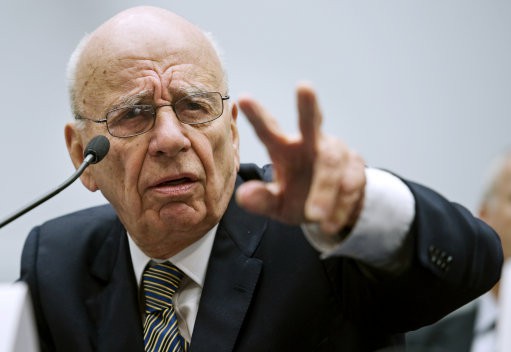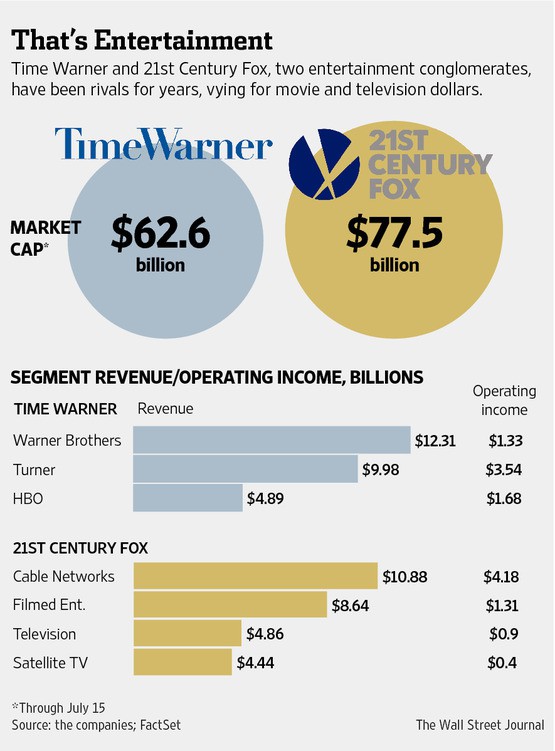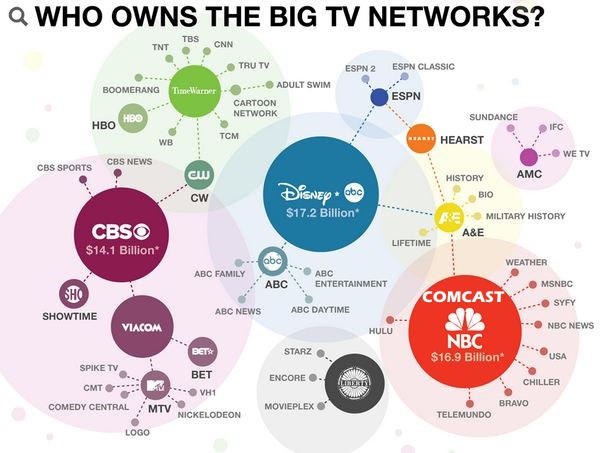[flv]http://www.phillipdampier.com/video/CNN Fox Time Warner Takeover 7-16-14.mp4[/flv]
CNN broke into regular programming this morning with “Breaking News” the news network may be acquired, at least temporarily, by Rupert Murdoch, owner of Fox News. (2:37)

Rupert Murdoch is grasping for Time Warner (Entertainment).
Rupert Murdoch usually gets what he wants. What he wants now is Time Warner (Entertainment), but he will have to pay a lot to get it.
This morning, Time Warner went public with its rejection of Murdoch’s opening bid of $80 billion, made through 21st Century Fox. That represents a 20% premium for Time Warner shareholders, but executives at the entertainment company that owns HBO, Cinemax, CNN and Turner Broadcasting delivered a firm “no” in response, calling Murdoch’s bid too low.
Although initially rebuffed, many believe the tenacious Murdoch will be back until he wears down Time Warner’s board.
“Rupert Murdoch is not going away,” said Porter Bibb, managing partner at Mediatech Capital Partners. “He’s going to keep upping the price until he gets it.”
Some analysts speculate the magic number will be somewhere in the $100 billion range, despite the fact sources tell CNN that Time Warner really prefers remaining independent.
In light of the recent frenzy of mergers among telecom entities, some believe Time Warner made a major mistake when it spun off its cable properties in 2009 to become wholly independent Time Warner Cable, which today has nothing to do with Time Warner itself. At the time it decided to part ways with its cable systems, the company was still restructuring itself after the failure of the 2000 AOL-Time Warner merger deal, which took years to completely unwind. While the early 2000s saw media consolidation as an important priority, the inability to properly monetize the joint assets of super-sized conglomerates made spinoffs more fashionable.
 Time Warner effectively sold off its in-house distribution platform: Time Warner Cable systems that could be easily convinced to carry every Time Warner-owned network. Comcast didn’t and has become a larger content and distribution company because of its ownership interests in cable networks and its acquisitions like NBC and Universal Studios.
Time Warner effectively sold off its in-house distribution platform: Time Warner Cable systems that could be easily convinced to carry every Time Warner-owned network. Comcast didn’t and has become a larger content and distribution company because of its ownership interests in cable networks and its acquisitions like NBC and Universal Studios.
Comparing the two models today, many Wall Street analysts believe Comcast’s vision that bigger is better is probably the right one, especially as cable television faces new competitive threats from online video.
Murdoch clearly believes that, and Bibb speculates Murdoch’s interest in Time Warner is really all about HBO.
[flv]http://www.phillipdampier.com/video/Bloomberg Murdoch Wants HBO 7-16-14.flv[/flv]
Bloomberg News talked with Porter Bibb, managing partner at Mediatech Capital Partners, who believes Rupert Murdoch would buy all of Time Warner just to get his hands on HBO. (6:29)
“It’s really now HBO that’s the driver, and I think that’s the Holy Grail that Rupert had his eye on,” said Porter Bibb, managing partner at Mediatech Capital Partners, said in a Bloomberg News radio interview. “It’s a huge money-maker with a huge potential. And probably the only Netflix killer that’s in the world right now.”

Fox and its advisers value HBO, the home of “Game of Thrones” and “Girls,” at more than $20 billion, said one person familiar with the negotiations.
HBO GO, HBO’s online streaming platform, is currently hamstrung by content companies imposing restrictions to make sure the online video service is only sold to HBO premium channel subscribers. Nobody can buy HBO GO a-la-carte. But the TV Everywhere-like service is wildly popular with subscribers, some who use it more than they actually watch HBO on linear television. Combining HBO’s coveted content with Fox’s deeper movie and television show library could deliver significant competition to Netflix and Amazon’s video offerings. Murdoch’s media empire is global, opening the door to an international streaming video service.
In short, Rupert Murdoch wants HBO so badly, he’s willing to buy all of Time Warner, Inc. to get it.
“If they succeed, if Rupert gets Time Warner, what he’s got is HBO and Warner Brothers and that’s it,” Bibb said. “He doesn’t need another movie studio. 21st Century Fox is doing great right now. It’s HBO.”
To avoid political landmines, the owner of Fox News Channel said he is willing to spin-off CNN to avoid perceptions that his favored conservative news channel would now control the second largest cable news network. But Murdoch would also effectively control three broadcast television networks if the deal succeeds — FOX, the CW, and MyNetworkTV. Admittedly the latter two lack significant audiences and don’t produce any news or public affairs programming, but they can have influence over their choice of local broadcast affiliates, some who still produce local news, especially in larger cities.
If a deal is reached, four giant media conglomerates will have control over 90 percent of American media.

[flv]http://www.phillipdampier.com/video/WSJ Time Warner Fox Merger 7-16-14.flv[/flv]
The Wall Street Journal notes this kind of media consolidation would never have been possible just a decade or two ago. But does another media mega-merger even make sense? A lot of those on Wall Street believe it does. (5:23)


 Subscribe
Subscribe Nearly two million people have listened to the
Nearly two million people have listened to the  Setting aside all that, we decided to investigate why Mr. Block was willing to subject himself to 18 minutes of phone hell to cancel his service.
Setting aside all that, we decided to investigate why Mr. Block was willing to subject himself to 18 minutes of phone hell to cancel his service. Friday is the last day to submit your views on Net Neutrality with the Federal Communications Commission. Although there may be some future opportunities to comment, it’s important to make your voice heard with the FCC today. Almost 650,000 Americans have done so to date, and we need to see this number rise even higher to combat the influence and power of Big Telecom companies looking to turn the Internet into a corporate toll booth.
Friday is the last day to submit your views on Net Neutrality with the Federal Communications Commission. Although there may be some future opportunities to comment, it’s important to make your voice heard with the FCC today. Almost 650,000 Americans have done so to date, and we need to see this number rise even higher to combat the influence and power of Big Telecom companies looking to turn the Internet into a corporate toll booth. Do you remember that high school love that killed you when they decided it was time to move on? You begged, you pleaded for them to change their mind to no avail. Nothing you said made any difference.
Do you remember that high school love that killed you when they decided it was time to move on? You begged, you pleaded for them to change their mind to no avail. Nothing you said made any difference. It all sounds like eavesdropping on your roommate’s breakup with their boyfriend. Or leaving a cult. This guy just can’t understand what the heck you were thinking when you decided Comcast was no longer right for you. Block was in no mood to explain himself, but for the benefit of others, we’d love to arm you with a few reasons to explain why you don’t want anything more to do with Comcast:
It all sounds like eavesdropping on your roommate’s breakup with their boyfriend. Or leaving a cult. This guy just can’t understand what the heck you were thinking when you decided Comcast was no longer right for you. Block was in no mood to explain himself, but for the benefit of others, we’d love to arm you with a few reasons to explain why you don’t want anything more to do with Comcast: The New York Public Service Commission needs to hear from you about the Comcast-Time Warner Cable merger. Unlike some of the southern and midwestern states that have utility commissions that basically rubber stamp the agenda of Big Telecom companies, New York’s PSC has a reputation for being tougher and more customer-oriented. But the PSC cannot act in your interest if you don’t share your views.
The New York Public Service Commission needs to hear from you about the Comcast-Time Warner Cable merger. Unlike some of the southern and midwestern states that have utility commissions that basically rubber stamp the agenda of Big Telecom companies, New York’s PSC has a reputation for being tougher and more customer-oriented. But the PSC cannot act in your interest if you don’t share your views.